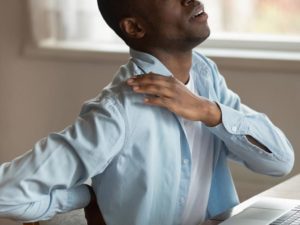
How to Handle Tingling in Your Back After an Accident
Many injuries sustained in a car accident are obvious immediately at the scene, like cuts and scrapes or even a broken bone. But what is also common is for a car accident to cause injuries that you can’t see and may not feel for days or weeks after the event. Many common injuries like whiplash have symptoms that don’t appear right away, like soreness, headaches, or back pain, but are signs that something more serious may be happening. A tingling sensation in your back is another sign of injury, particularly a pinched nerve, which means you should see a car accident chiropractor.
About Pinched Nerves
What is commonly known as a pinched nerve is actually a medical condition known as nerve compression. Nerves that are rooted in your back can be compressed or pinched, causing pain, numbness, weakness, or tingling. The tingling sensation may be described as “pins and needles,” similar to the feeling when you’ve sat with your legs crossed for too long and your foot “falls asleep.” This is actually a temporary form of a pinched nerve that resolves on its own, while an injury may last longer.
When you’ve suffered a pinched nerve, you may feel pain in the area where the nerve sits, but the pain can also radiate to other areas of the body. This is known as referred pain and may start in your back, then shoot down your limbs, often down the leg. In some cases, you’ll notice this right after your accident, or they may be more obvious later when you make a sudden movement or the compression worsens.
Car Accident Injuries Cause Pinched Nerves
Many car accident injuries involve force that moves the body into uncomfortable or unnatural positions that lead to pinched nerves and the tingling sensation in your back. Below are some injuries that are likely to lead to this condition.
Spine Injuries
The spinal column houses the nervous system, a series of connected nerves that sends signals to the rest of your body around sensations and movement. If damage occurs to the spine, the nervous system may be harmed as well. During a car accident, your spine is often moved in violent or unnatural ways that lead to damage. Any bruises, scrapes, or muscle pains in your back may indicate a spine injury, in addition to a tingling feeling.
Whiplash
One of the most common car crash injuries is whiplash, which occurs when the force of the accident causes the head to jerk forward and then backward, straining your neck muscles beyond their normal ability. When neck muscles cannot properly support the spine, damage and inflammation can occur, putting pressure on nearby nerves.
Herniated Discs
When whiplash or other injuries affect the soft discs between vertebrae, they can be knocked out of place, pressing on a nerve and leading to a tingling sensation. Herniated discs can occur as a result of blunt force trauma. This pressure applied to a nerve makes it unable to function properly, leading to pain, numbness, or tingling.
Monitoring Tingling Sensations at Home
No matter how small or temporary your symptoms are, you should always visit a car accident chiropractor for treatment after the collision. Many injuries will take hours or days before symptoms appear, once the shock and adrenaline wear off and swelling is reduced. But a chiropractor will be able to identify signs of an injury even before symptoms appear and begin treatment early. Once tingling begins, you should seek treatment within a few days, especially if it worsens or lasts for longer periods of time.
In the case of a mild pinched nerve, your doctor will likely recommend at-home treatments to relieve the pain and encourage healing. Rest and mild pain relievers can sometimes be enough to reduce tingling after a few days. Alternating ice and heat may also help support strained muscles and reduce inflammation.
Treating Pinched Nerves
In more serious cases of nerve compression, a car accident chiropractor may recommend mild medical interventions to reduce pain. This may mean adjustments or physical therapy, or you could be referred out to other specialists like an orthopedist to further review the damage to the spine and recommend treatment.
